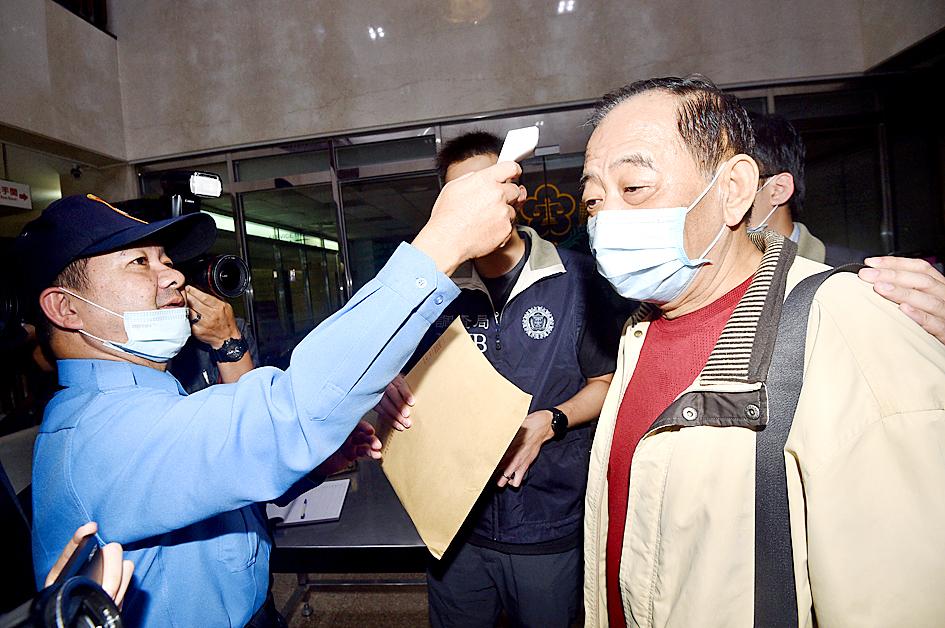The Taipei District Prosecutors’ Office yesterday indicted four retired Military Intelligence Bureau (MIB) officials, who are accused of providing China with a list of bureau personnel and other classified materials while attempting to recruit colleagues into a spy network in Taiwan.
Prosecutors charged Chang Chao-jan (張超然), Chou Tien-tzu (周天慈) and Wang Ta-wang (王大旺), former colonels at the bureau, and Yueh Chih-chung (岳志忠) — a former major general and chief of the MIB’s Fifth Bureau, where he was in charge of sending agents to China on covert assignments — with breaches of the National Security Act (國家安全法) and the National Intelligence Services Act (國家情報工作法).
In 1999 Chang was dispatched to China to locate a fellow MIB officer surnamed Lu (陸), who was arrested by Chinese authorities, prosecutors said, adding that Chang had befriended a Chinese security official surnamed Wei (韋), based in Guangzhou.

Photo: Peter Lo, Taipei Times
Chang was recruited to spy for China by Wei, who enticed Chang with money and travel, prosecutors said, adding that Wei instructed Chang to provide names of MIB personnel and their job functions.
Investigators said that Chou was later recruited, and he and Chang worked in tandem, passing on classified information and materials, as well introducing fellow officers to Wei when they were in China, sometimes on official assignments.
After their retirement, Chang and Chou made numerous trips to China starting in 2012, on the pretext that they were on personal or family vacations, and met with Wei and other Chinese intelligence officers, prosecutors said.
They later learned that Yueh had plans to visit his family in China, but Yueh was concerned that his MIB background might make it difficult for him to enter the country, prosecutors said, adding that Chang and Chou then persuaded Yueh to meet Wei in Macau.
The three flew to Macau in 2012, where they met with Wei, who worked with Yueh to identify more than 20 MIB agents from photographs, prosecutors said.
After being promised money, Yueh allegedly agreed to provide other classified information on the bureau’s operations, hierarchy and structure, they said, adding that Yueh was paid HK$6,000 (US$774) and received other gifts.
Chou allegedly accompanied Yueh to China in 2016 and 2018, when they met with Wei and other Chinese intelligence officers to provide additional classified information, prosecutors said, adding that Yueh allegedly later took trips to other Chinese cities with all expenses and accommodation paid for by Wei.
Chang in 2016 allegedly persuaded Wang to visit China, as Wang also had family there, prosecutors said.
Wang visited Guangzhou in August that year and had a meeting with Wei, during which Wang allegedly agreed to provide information on the bureau and other Taiwanese intelligence operations, in exchange for money and gifts, prosecutors said.
Investigators said that Chang and Chou were also active in Taiwan, working to recruit bureau and military officers to develop a spy network to access and obtain sensitive materials for the Chinese government in exchange for money.

GAINING STEAM: The scheme initially failed to gather much attention, with only 188 cards issued in its first year, but gained popularity amid the COVID-19 pandemic Applications for the Employment Gold Card have increased in the past few years, with the card having been issued to a total of 13,191 people from 101 countries since its introduction in 2018, the National Development Council (NDC) said yesterday. Those who have received the card have included celebrities, such as former NBA star Dwight Howard and Australian-South Korean cheerleader Dahye Lee, the NDC said. The four-in-one Employment Gold Card combines a work permit, resident visa, Alien Resident Certificate (ARC) and re-entry permit. It was first introduced in February 2018 through the Act Governing Recruitment and Employment of Foreign Professionals (外國專業人才延攬及雇用法),

RESILIENCE: Deepening bilateral cooperation would extend the peace sustained over the 45 years since the Taiwan Relations Act, Greene said Taiwan-US relations are built on deep economic ties and shared values, American Institute in Taiwan (AIT) Director Raymond Greene said yesterday, adding that strengthening supply chain security in critical industries, enhancing societal resilience through cooperation and deepening partnerships are key to ensuring peace and stability for Taiwan in the years ahead. Greene made the remarks at the National Security Youth Forum, organized by National Taiwan University’s National Security and Strategy Studies Institution in Taipei. In his address in Mandarin Chinese, Greene said the Taiwan-US relationship is built on deep economic ties and shared interests, and grows stronger through the enduring friendship between

CAUTION URGED: Xiaohongshu and Douyin — the Chinese version of TikTok — are tools the Chinese government uses for its ‘united front’ propaganda, the MAC said Mainland Affairs Council (MAC) Minister Chiu Chui-cheng (邱垂正) yesterday urged people who use Chinese social media platforms to be cautious of being influenced by Beijing’s “united front” propaganda and undermining Taiwan’s sovereignty. Chiu made the remarks in response to queries about Chinese academic Zhang Weiwei (張維為) saying that as young Taiwanese are fond of interacting on Chinese app Xiaohongshu (小紅書, known as RedNote in English), “after unification with China, it would be easier to govern Taiwan than Hong Kong.” Zhang is professor of international relations at Shanghai’s Fudan University and director of its China Institute. When giving a speech at China’s Wuhan

ENHANCE DETERRENCE: Taiwan has to display ‘fierce resolve’ to defend itself for China to understand that the costs of war outweigh potential gains, Koo said Taiwan’s armed forces must reach a high level of combat readiness by 2027 to effectively deter a potential Chinese invasion, Minister of National Defense Wellington Koo (顧立雄) said in an interview with the Chinese-language Liberty Times (sister newspaper of the Taipei Times) published yesterday. His comments came three days after US Secretary of State Marco Rubio told the US Senate that deterring a Chinese attack on Taiwan requires making a conflict “cost more than what it’s worth.” Rubio made the remarks in response to a question about US policy on Taiwan’s defense from Republican Senator John Cornyn, who said that Chinese